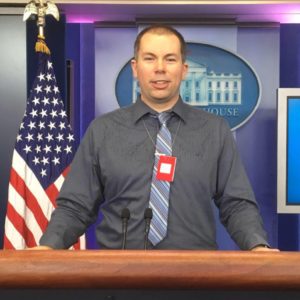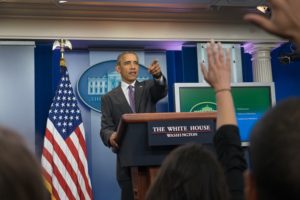What Makes National News
College students from around the country chatted excitedly as they gathered in the White House press briefing room, for what many hoped would only be the first time in their careers. An electric energy buzzed around the room as 50 college students were presented with their first opportunity to cover political topics on the national stage, at the White House’s first annual College Reporter Day.
“This was the first time I covered national politics as a reporter,” said Josh Zytkiewicz a junior at Wisconsin’s Madison College, “I was worried that my lack of experience would show to other students attending, but everyone had so many different skill sets it was really just a great experience to network in general.”
“This was the first time I felt like a real reporter,” said Efe Atli, a junior at the University of California Berkley , “we were given press releases and prep material, and all of the experiences I had that day just confirmed for me that [journalism] is really what I want to do for the rest of my life.”

Josh Zytkiewicz poses for a photo in the White House Press Briefing Room.
Photo Credit: Josh Zytkiewicz
Participating students were treated much like their older contemporaries, having been given press releases, speaker bios and were invited to participate in a pre-event informational call with White House staff the day before the event. It can be easy to assume that the White House provided all of the background information the students could possibly require, but journalists are taught to question everything. This presents a dilemma that many journalists must learn to overcome through experience, how to decipher what is actually news, and what is simply PR fluff.
Stacie Sherman, Trenton Bureau Chief of Bloomberg News, has spent most of her career covering politics at both the state and national level, and has come to collect a variety of tactics to determine what the facts are in political news.
“My biggest piece of advice when going into something like a press conference is to be prepared as possible,” said Sherman, “you are obviously going to have the information from the press release they have given you, but you should be as knowledgeable as possible, and you should always do your own research after looking at the press release.”
It is often the case that the story is not within the information provided in a press release, but is the information that is left out or hidden. Press releases are always going to present the best information and data at the top of the page. Additionally, all of the information given in a press release is going to be presented in the best light.
“In hindsight I wish I looked at the press material more before everything started, I think I went to it a little blind and didn’t know what to be prepared for at all,” said Atil.
Sherman also advised that balance should always be strived for, it’s essential to create contacts both within and outside the government. When potential sources are hesitant to open up Sherman has found it helpful to state that she is simply trying to do her job to the best of her ability.
“What works best is usually telling the person or source is that you are really trying to create a balanced story, and that you need their voice to find that balance,” said Sherman, “I’m trying to find balance but no one is talking to me, works more than you think it would.”
Catching skewed information is also key in determining what is presented as fact, and what actually fact is. Everything is going to be presented in the best light possible, this is why it is so essential to do your own research and to have your own sources.
“One has to realize that a press release is much closer to an advertisement than an encyclopedia, any organization, be it government or a private firm puts out a press release to show themselves in the best light, “ said Zytkiewicz upon reflecting on his overall experience at College Reporter Day, “the whole day definitely taught me that I have a lot more to learn as a reporter.”
Covering national politics and events is certainly exciting but it is important to remember that balance is always the goal. It is essential to not get caught up in the importance of the topic, but to instead create through and objective piece. Outside sources, and an understanding of PR operations only aid journalists in their ultimate pursuit of the facts.


